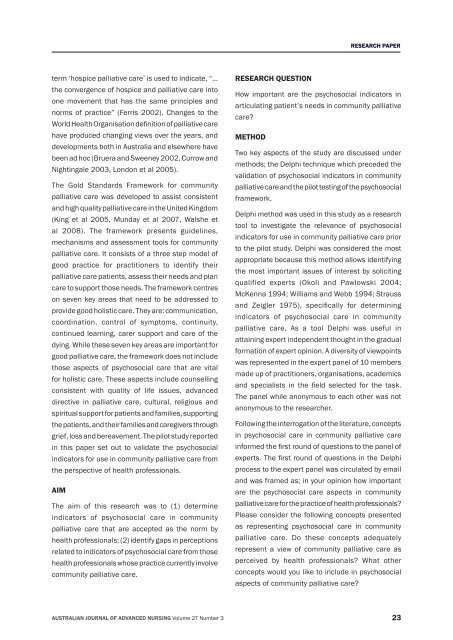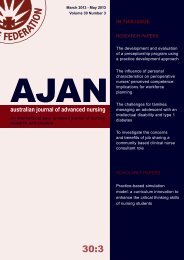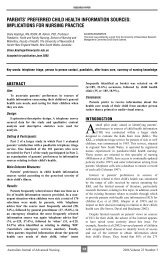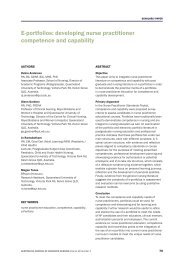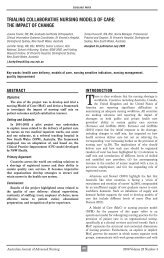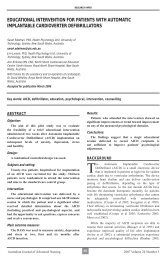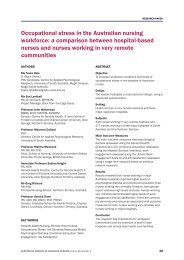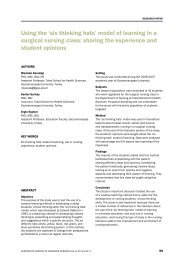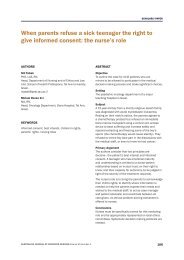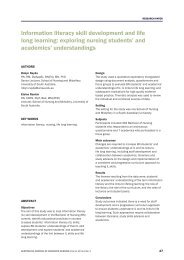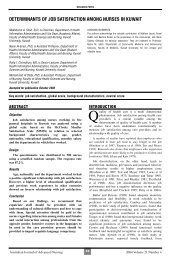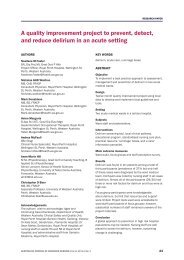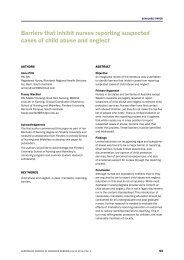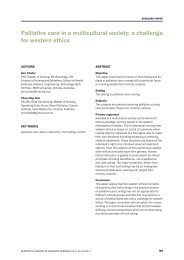March-May, 2010 - Australian Journal of Advanced Nursing
March-May, 2010 - Australian Journal of Advanced Nursing
March-May, 2010 - Australian Journal of Advanced Nursing
Create successful ePaper yourself
Turn your PDF publications into a flip-book with our unique Google optimized e-Paper software.
RESEARCH PAPER<br />
term ‘hospice palliative care’ is used to indicate, “…<br />
the convergence <strong>of</strong> hospice and palliative care into<br />
one movement that has the same principles and<br />
norms <strong>of</strong> practice” (Ferris 2002). Changes to the<br />
World Health Organisation definition <strong>of</strong> palliative care<br />
have produced changing views over the years, and<br />
developments both in Australia and elsewhere have<br />
been ad hoc (Bruera and Sweeney 2002, Currow and<br />
Nightingale 2003, London et al 2005).<br />
The Gold Standards Framework for community<br />
palliative care was developed to assist consistent<br />
and high quality palliative care in the United Kingdom<br />
(King et al 2005, Munday et al 2007, Walshe et<br />
al 2008). The framework presents guidelines,<br />
mechanisms and assessment tools for community<br />
palliative care. It consists <strong>of</strong> a three step model <strong>of</strong><br />
good practice for practitioners to identify their<br />
palliative care patients, assess their needs and plan<br />
care to support those needs. The framework centres<br />
on seven key areas that need to be addressed to<br />
provide good holistic care. They are: communication,<br />
coordination, control <strong>of</strong> symptoms, continuity,<br />
continued learning, carer support and care <strong>of</strong> the<br />
dying. While these seven key areas are important for<br />
good palliative care, the framework does not include<br />
those aspects <strong>of</strong> psychosocial care that are vital<br />
for holistic care. These aspects include counselling<br />
consistent with quality <strong>of</strong> life issues, advanced<br />
directive in palliative care, cultural, religious and<br />
spiritual support for patients and families, supporting<br />
the patients, and their families and caregivers through<br />
grief, loss and bereavement. The pilot study reported<br />
in this paper set out to validate the psychosocial<br />
indicators for use in community palliative care from<br />
the perspective <strong>of</strong> health pr<strong>of</strong>essionals.<br />
AIM<br />
The aim <strong>of</strong> this research was to (1) determine<br />
indicators <strong>of</strong> psychosocial care in community<br />
palliative care that are accepted as the norm by<br />
health pr<strong>of</strong>essionals; (2) identify gaps in perceptions<br />
related to indicators <strong>of</strong> psychosocial care from those<br />
health pr<strong>of</strong>essionals whose practice currently involve<br />
community palliative care.<br />
RESEARCH QUESTION<br />
How important are the psychosocial indicators in<br />
articulating patient’s needs in community palliative<br />
care?<br />
METHOD<br />
Two key aspects <strong>of</strong> the study are discussed under<br />
methods; the Delphi technique which preceded the<br />
validation <strong>of</strong> psychosocial indicators in community<br />
palliative care and the pilot testing <strong>of</strong> the psychosocial<br />
framework.<br />
Delphi method was used in this study as a research<br />
tool to investigate the relevance <strong>of</strong> psychosocial<br />
indicators for use in community palliative care prior<br />
to the pilot study. Delphi was considered the most<br />
appropriate because this method allows identifying<br />
the most important issues <strong>of</strong> interest by soliciting<br />
qualified experts (Okoli and Pawlowski 2004;<br />
McKenna 1994; Williams and Webb 1994; Strauss<br />
and Zeigler 1975), specifically for determining<br />
indicators <strong>of</strong> psychosocial care in community<br />
palliative care. As a tool Delphi was useful in<br />
attaining expert independent thought in the gradual<br />
formation <strong>of</strong> expert opinion. A diversity <strong>of</strong> viewpoints<br />
was represented in the expert panel <strong>of</strong> 10 members<br />
made up <strong>of</strong> practitioners, organisations, academics<br />
and specialists in the field selected for the task.<br />
The panel while anonymous to each other was not<br />
anonymous to the researcher.<br />
Following the interrogation <strong>of</strong> the literature, concepts<br />
in psychosocial care in community palliative care<br />
informed the first round <strong>of</strong> questions to the panel <strong>of</strong><br />
experts. The first round <strong>of</strong> questions in the Delphi<br />
process to the expert panel was circulated by email<br />
and was framed as; in your opinion how important<br />
are the psychosocial care aspects in community<br />
palliative care for the practice <strong>of</strong> health pr<strong>of</strong>essionals?<br />
Please consider the following concepts presented<br />
as representing psychosocial care in community<br />
palliative care. Do these concepts adequately<br />
represent a view <strong>of</strong> community palliative care as<br />
perceived by health pr<strong>of</strong>essionals? What other<br />
concepts would you like to include in psychosocial<br />
aspects <strong>of</strong> community palliative care?<br />
AUSTRALIAN JOURNAL OF ADVANCED NURSING Volume 27 Number 3 23


